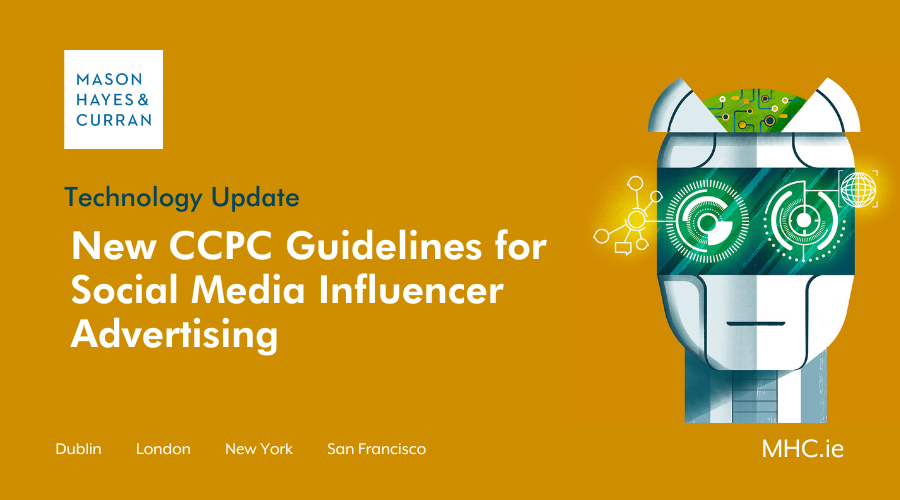New CCPC Guidelines for Social Media Influencer Advertising

Recently described as a ‘juggernaut’ industry, the influencer advertising sector is thriving in Ireland. In light of this significant growth, the CCPC recently published new guidance for social media influencers on the advertising and promotion of products and services on online platforms. Technology partner, Wendy Hederman looks at the impact of this guidance on brand owners and online platforms.
The CCPC’s new guidelines set out prescriptive labels and other forms of advertisement identification which influencers must use when posting advertisements and other forms of commercial content online.
The purpose of the new labels is to enable an influencer’s consumer audience to immediately recognise and understand that content is an advertisement or other type of commercial communication before a consumer actively engages with it.
The publication of the new guidelines reflect the CCPC’s, and ASAI’s, increased activity in the realm of influencer advertising on online platforms, It also builds on the CCPC’s findings and recommendations in its Influencer Marketing research report, which was published in November 2022.
Who is an influencer? Who do the new guidelines apply to?
The new guidelines apply to a broad range of individuals who can be categorised as acting as an “influencer”, ie anyone on an online platform who receives a form of commercial benefit for posting content, whether it be on a post, story, video or otherwise. For example, types of commercial benefit may include:
- Financial payments
- Free or discounted products, experiences, trips and services
- The sharing of discount codes or affiliate links with followers for commission or other benefit
- Promotion of an influencer’s own brand or brand of a family member or friend, whether fully or partially owned
- Where the influencer is commercially connected to the brand, and
- Any other commercial aspect
The term “influencer” can also extend to content creators, streamers, bloggers and other celebrity or media personalities.
What are the new advertising labels that influencers must use?
The CCPC’s new guidelines prescribe the labels which influencers must use for advertisements and commercial content. The new labels are divided into two groups: primary advertisement labels and secondary advertisement labels.
For primary labels, at least one must be present in every commercial post or advertisement. Then, where appropriate, secondary labels should only be used along with 1 or more of the primary labels. The use of the secondary labels is optional and should only be used where necessary in the context of a particular commercial arrangement. Influencers should be careful to not overuse secondary labels in order to avoid confusing consumers.
Primary Labels |
Secondary Labels |
|
|
|
|
|
It may also be helpful for influencers to declare when something is not an advertisement, provided that this is truthful. This way, consumers can also instantly recognise where something is not an advertisement or commercial content.
What do the new guidelines mean for brands?
Brands who engage influencers to promote their products and services on online platforms should ensure to inform themselves of their legal responsibilities towards consumers. It is important that brands warn influencers promoting their products and services to adhere to the new guidelines.
Where influencers do not take heed of the new guidelines, this may result in complaints by consumers or consumer groups to the Advertising Standards Authority of Ireland (ASAI). If upheld, the ASAI may publish the complaints and subsequent findings. This can carry reputational and commercial implications for both the influencer and brand concerned.
What do the new guidelines mean for online platforms?
As part of its research, the CCPC has directed some of its recommendations at online platforms.
Online platforms should consider implementing practices and strategies to:
- Support users to appropriately label advertising content. This will help to deter the risk of hidden or misleading advertising content.
- Inform and educate influencers on the risks of misleading advertising and of not using the mandatory labels and ensure that there are clear policies in place for influencers to follow.
- Inform and educate users generally, including brands and consumers, on the risks of hidden or misleading advertising, and facilitate the reporting of hidden and misleading advertising content.
These recommendations take on additional merit when we consider that EU regulation of online platforms has significantly increased in the last few years. Under Article 25 of the EU’s Digital Services Act, for example, online platforms must ensure that their platforms are not designed, organised or operated in a way that may deceive or manipulate users, or in a way that materially distorts or impairs the ability of users to make free and informed decisions. Failure to enable users of a platform to identify an ad, or disguised ads, could arguably amount to a breach of this platform design obligation.
Are there any existing laws in place that regulate influencer advertising?
Yes. In Ireland, influencer advertising is currently governed by a number of Irish and EU laws, as well as the ASAI’s self-regulatory code. These include:
Consumer Protection Act 2007
This legislation implements the requirements of the Unfair Commercial Practices Directive into Irish law. Influencers have a responsibility to label commercial content under this Act. Failure to identify the commercial intent of an advertisement can amount to a misleading commercial practice. This typically applies to the trader, ie the brand selling a product or service to consumers. However, it can extend to persons acting on behalf of the trader. This means that influencers promoting goods or services on behalf of a trader also have obligations under this legislation.
It is a prohibited commercial practice to:
- Use editorial content in media to promote products where it is a paid promotion without making it clear to the consumer that it is a paid-for promotion, and/or
- Falsely represent or create the impression that they are a consumer when they are in fact a trader or influencer acting for a trader.
Consumer Rights Act 2022
This legislation implements the requirements of the EU Omnibus Directive into Irish law which introduced new requirements for transparency in advertising. Public statements made by brands and businesses in advertising, or influencers representing those brands or businesses, will be considered by regulators when looking at whether a product or service (including digital content and digital services) meets statutory conformity requirements.
It is important for businesses to ensure that their contracts with influencers include accurate descriptions of products or services along with clear instructions on how to label promotional content and describe the products or services in public statements. Failure to do so could result in a higher threshold to be met for conformity requirements and/or enforcement by regulators for potentially misleading commercial practices.
ASAI Code
The ASAI Code applies to all types of marketing communications, including online advertisements and paid for promotional content. Marketing communications must be designed and presented in a way that makes clear that it is a marketing communication. It also obliges businesses to make sure that any advertorial content is not misrepresented as editorial content.
What’s next?
Regulatory activity has already begun with the recent launch by the ASAI of a Social Media Influencer Reporting tool on its website by which the public can submit anonymous complaints about influencers and brands who do not comply with the new rules. Over 800 complaints were made using this novel tool in the final weeks of 2023. Given the new regulatory focus on influencer advertising, it is likely that 2024 will see even greater enforcement action against influencers, brands, and potentially online platforms, who fail to adhere to the new guidelines.
We recommend that organisations take measures now to ensure they equip influencers to adequately disclose their advertising content and branded content, with a particular focus on informing influencers to be aware that they must use the new labels.
The digital design and presentation of the user experience on a company’s website, previously a matter for developers and creative teams, is increasingly becoming a matter on which companies’ legal teams and external lawyers have significant input. Businesses with consumer facing platforms, and businesses which utilise influencers on consumer facing platforms for digital commerce, should review their current compliance with consumer legislation.
Greater focus should be given to consumer behaviour when engaging influencers. Businesses are encouraged to carry out ongoing compliance reviews in light of emerging legislation and market practices. In addition, when creative teams are working on strategies for the presentation of a new product or layout of a new website, the consumer user’s position and the impact of presentation and design choices on that consumer user’s understanding should be considered.
We possess market leading experience in advertising laws and the requirements of regulatory guidance and are well placed to assist companies with their compliance needs. Contact a member of our Technology team for expert advice and guidance.
People also Ask
What are the new rules for influencers in Ireland? |
The new rules for influencers in Ireland are prescriptive guidelines from the CCPC on how influencers must label advertisements and promotional content for which they receive some form of compensation or financial payment. |
The content of this article is provided for information purposes only and does not constitute legal or other advice.
Share this:



